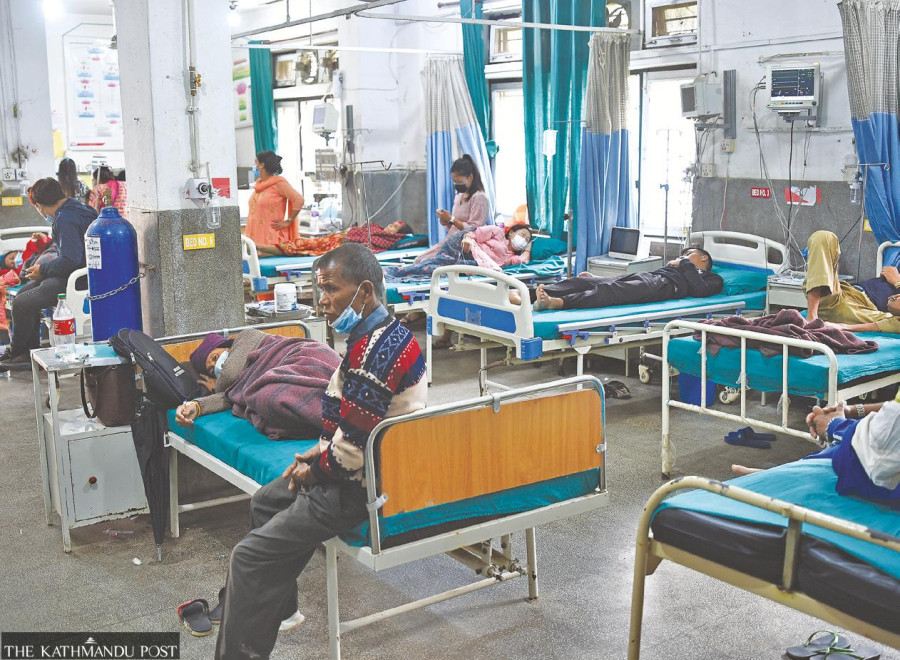Valley
KMC announces free ambulance and counselling for dengue patients
Experts say it’s little and late. Kathmandu city had 1,500 dengue patients until Thursday.
Anup Ojha
On Thursday, Kathmandu mayor Balendra Shah wrote on Facebook to announce the launch of a 24-hour telephone-based counselling service for dengue patients. He also announced that the City would provide free ambulance service for dengue-related emergencies.
The city has set up a hotline number 1180 manned by health workers for free consultation. Likewise, any dengue patient needing ambulance service has been asked to call 102. The City said ten ambulances are on the standby.
While experts have lauded the new services, they said it is little and came late as the City should have taken early initiatives to prevent dengue spread.
“I had publicly asked the authorities to conduct a dengue mosquito search and destroy campaign two months ago. But they, including the City authorities, didn’t heed by call,” said Dr Sher Bahadur Pun, chief of the Clinical Research Unit at Sukraraj Tropical and Infectious Disease Hospital.
He said almost every household in the City has dengue patients as dengue mosquitoes are flying amok in every nook and corner of the Valley.
“Although it came late, the ambulance service might be helpful, but I don’t think the hotline numbers would be of much use. They should have invested in preventive measures,” said Pun.
Dr Baburam Marasini, former director at the Epidemiology and Disease Control Division echoed Pun and called the new services a ‘publicity stunt’ by the Kathmandu Metropolitan City.
“What would they counsel to a dengue patient? They should not have allowed the disease to spread in the first place. They should arrange more ambulances,” he said.
Since there is no medicine for dengue treatment other than paracetamol, Dr Marasini finds the telephone counseling service irrelevant.
“They should instead offer free treatment,” he said.
Both Pun and Marasini said dengue would not go out of control had the authorities including the City launched a search-and-destroy campaign just a month ago.
Dengue is transmitted by the bite of an infected female Aedes aegypti or Aedes albopictus mosquito. The same vector also transmits chikungunya, yellow fever, and Zika virus. The global incidence of dengue has grown dramatically in recent decades.
According to the Sukraraj Tropical and Infectious Disease Hospital, Teku, around 150 people infected with dengue have been visiting the hospital every day. Bir and Tribhuvan University Teaching hospitals said around 80 to 90 dengue patients have been coming for treatment daily.
Dr Pun recalled the dengue outbreak of 2019 when at least six people died and over 17,000 were hospitalized.
Abdominal pain, vomiting, bleeding from the gums and nose, vomiting blood and blood in stool, tiredness, and restlessness are some of the symptoms of severe dengue.
Doctors say, severe dengue is the leading cause of serious illness and death.
According to the City's Public Health Department 50 volunteers have been deployed for its dengue awareness programme and for mosquito search-and-destroy campaign. Under the campaign, city workers in all 32 wards spray insecticide in toilets, bushes and waterlogged areas.
According to officials, 3,500 people were infected with dengue in Kathmandu district until Thursday and 1,500 of them were in Kathmandu City.
Kathmandu reported the first case of dengue in May and a second one in June. By July-end, the caseload had increased to 35. The viral disease saw a marked surge in August, with over 700 infections reported in the month.
This is not the first time Kathmandu City officials have failed to take disease prevention measures. Even during the Covid-19 pandemic in May last year, the city appeared woefully lacking in Covid-19 preparedness compared to Lalitpur and Bhaktapur.
The Epidemiology and Disease Control Division’s data show 13,007 people have been infected with the dengue virus across the country so far this year. The number of infected patients could be 10 times more as 90 percent of the cases are asymptomatic, officials said.
Of the total infections, over 70 percent are in 10 districts, including Lalitpur, Kathmandu, and Makawanpur, according to officials. They say office-goers and school children have been infected in large numbers.




 9.83°C Kathmandu
9.83°C Kathmandu.jpg)














